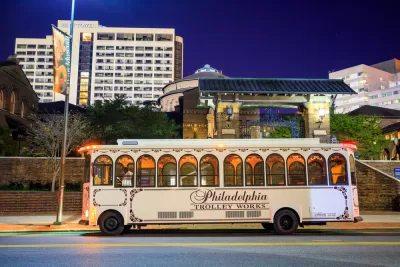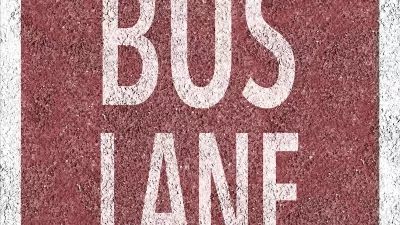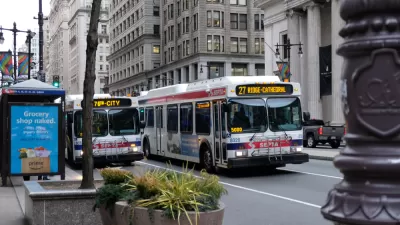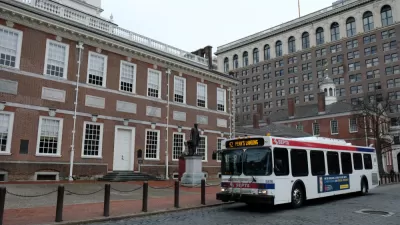The plan, which looks more than two decades into the future, seeks to modernize the city's transit system, address inequities, and improve regional connectivity.

Philadelphia officials unveiled an ambitious 24-year plan for the city's transit system that "aims to improve the system while addressing long-standing racial inequities through a redesigned bus network and Regional Rail service, modernized trolleys, and increased accessibility across the system." The plan, reports Darryl C. Murphy for WHYY, includes both current projects and "aspirational" but as-yet-unfunded ideas.
Philadelphia Deputy Managing Director for Transportation Michael Carroll said the plan "will help the city and [the Southeastern Pennsylvania Transportation Authority] compete for federal grants and align projects in a challenging post-pandemic economic landscape" while addressing the legacy of historical inequities in the city's transportation policies. "For instance, residents of color face commutes that are on average 12 minutes longer than white residents," and low-income commuters spend more on transit "because of transfer fees and connectivity challenges in neighborhoods outside of the city’s downtown core," writes Murphy. A restructured fare plan introduced by SEPTA last year seeks to address these issues and make the system more affordable.
"The plan unveiled Monday includes 30 corridors for improvements such as bus lanes, transit priority signals, and boarding islands to speed up bus service as options" and highlights the importance of Regional Rail. "This isn’t just about connecting suburban commuters downtown. More than 40% of Philadelphians work outside of the city," says City Councilmember Cherelle Parker in the article. The plan, which involved collaboration from multiple agencies and community groups, could signal a new level of regional cooperation.
FULL STORY: Faster buses, more Regional Rail, modern trolleys: Philly’s transit plan takes system to 2045

Alabama: Trump Terminates Settlements for Black Communities Harmed By Raw Sewage
Trump deemed the landmark civil rights agreement “illegal DEI and environmental justice policy.”

Planetizen Federal Action Tracker
A weekly monitor of how Trump’s orders and actions are impacting planners and planning in America.

The 120 Year Old Tiny Home Villages That Sheltered San Francisco’s Earthquake Refugees
More than a century ago, San Francisco mobilized to house thousands of residents displaced by the 1906 earthquake. Could their strategy offer a model for the present?

In Both Crashes and Crime, Public Transportation is Far Safer than Driving
Contrary to popular assumptions, public transportation has far lower crash and crime rates than automobile travel. For safer communities, improve and encourage transit travel.

Report: Zoning Reforms Should Complement Nashville’s Ambitious Transit Plan
Without reform, restrictive zoning codes will limit the impact of the city’s planned transit expansion and could exclude some of the residents who depend on transit the most.

Judge Orders Release of Frozen IRA, IIJA Funding
The decision is a victory for environmental groups who charged that freezing funds for critical infrastructure and disaster response programs caused “real and irreparable harm” to communities.
Urban Design for Planners 1: Software Tools
This six-course series explores essential urban design concepts using open source software and equips planners with the tools they need to participate fully in the urban design process.
Planning for Universal Design
Learn the tools for implementing Universal Design in planning regulations.
Clanton & Associates, Inc.
Jessamine County Fiscal Court
Institute for Housing and Urban Development Studies (IHS)
City of Grandview
Harvard GSD Executive Education
Toledo-Lucas County Plan Commissions
Salt Lake City
NYU Wagner Graduate School of Public Service





























